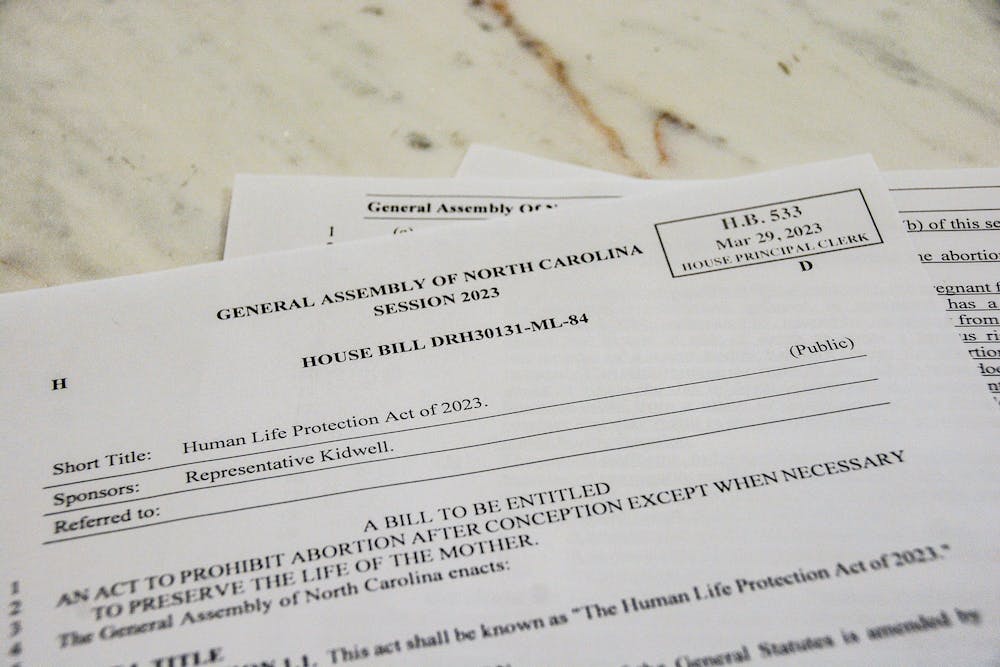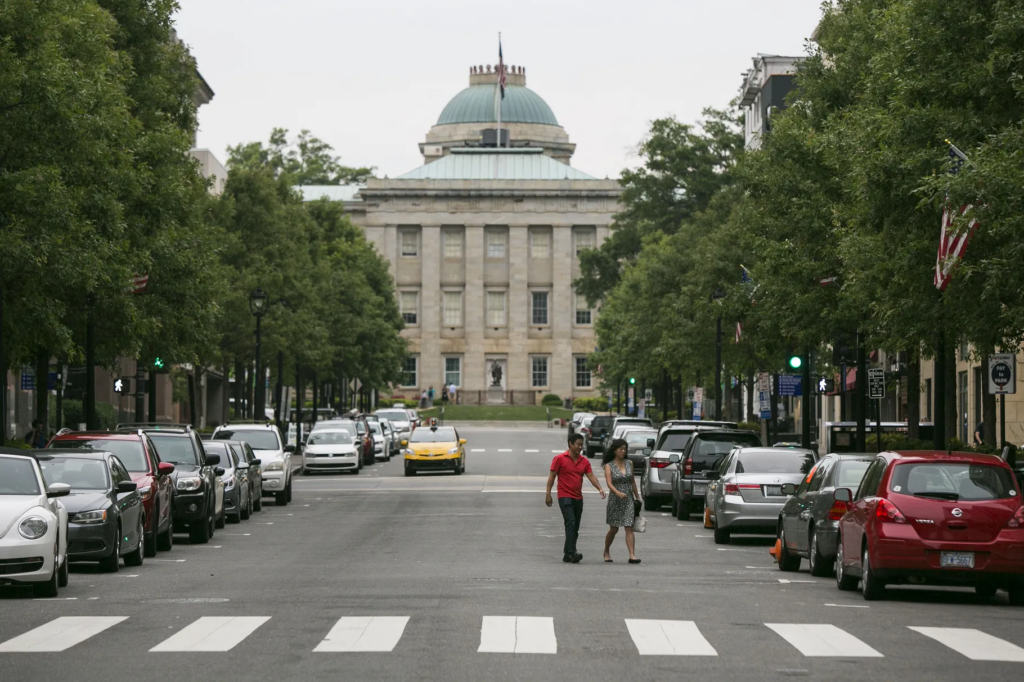
Since June 2022’s landmark Dobbs v. Jackson decision returned regulatory power of abortion to the individual states, North Carolina has been embroiled in a hugely partisan divide over the future of abortion in the state. Represented by the state’s Democratic and Republican Parties, led by Governor Roy Cooper and NC House Speaker Tim Moore respectively, North Carolina’s political battleground over abortion and reproductive rights typifies the contentious and ever-shifting nature of this debate throughout the United States as a whole.
On July 6th, 2022, just a week and a half after the Dobbs decision, Governor Roy Cooper issued an executive order to protect access to reproductive health care in North Carolina. This order, which was effective immediately upon its release, explicitly protects all reproductive health services “including, but not limited to, services relating to pregnancy, contraception, or the termination of a pregnancy” [2]. However, despite Cooper’s efforts, North Carolina has made other moves to restrict abortion. On August 17th, 2022, District Judge William Osteen lifted an injunction on an NC law that bans abortion past 20 weeks. While Osteen had originally blocked this law from enforcement in 2019, he cited Dobbs as justification for reinstating the ban, as “there is now no constitutional right to a pre-viability abortion, thus depriving the injunction of any constitutional basis” [5]. Where Speaker Tim Moore lauded this decision as “a ruling that upholds the law”, Cooper publicly criticized it, stating that “denying women necessary medical care in extreme and threatening situations, even if rare, is fundamentally wrong” [5]. As North Carolina law currently stands, abortion is legal up to 20 weeks.
In the past month, NC Republican lawmakers gained increasing traction to further abortion prohibitions. Previously, the NC GOP publicly discussed options for banning abortions either after the first trimester or based on fetal cardiac activity in a so-called “heartbeat bill” [4]. However, on March 29th, 2023, Representative Kidwell, R-Beaufort, filed HB-533, or “Human Life Protection Act” which would “prohibit abortion after conception except when necessary to preserve the life of the mother” [4]. This bill is significantly more restrictive than the previously discussed options, cutting access to abortion with few exceptions and at a criminal cost to health providers. At the time that HB-533 was introduced, it was expected to face gubernatorial veto, which could not be overruled by the Republican Party, and was expected to act as a symbolic gateway to pave the way for similar, but slightly less restrictive legislation surrounding abortion.

However, on March 30th, the tides shifted for the NC GOP as State Representative Tricia Cotham announced she would no longer be a Democrat, stating that “The modern-day Democratic Party has become unrecognizable to me and to so many others throughout this state and this country” [1]. Representing the 112th District in Mecklenburg County, Representative Cotham has historically been a reliable Democratic vote in the State House. In fact, she once shared her personal experience with abortion on the House floor, “accusing Republican lawmakers of ‘wanting to play doctor’” [1]. Regardless, Cotham’s defection allowed the Republican Party to secure a veto-proof supermajority in both the State House and Senate, which could help to push bills like HB-533 that Governor Cooper would have vetoed into North Carolina law. Since Governor Cooper took office in 2017, he has vetoed over 75 Republican-sponsored bills, so this power shift is sure to have lasting ramifications in the NC legislature [1].
Despite these shifting restrictions, North Carolina experienced a 37% increase in abortions between April and August 2022, which is the largest surge in care experienced by any state sincethe fall of Roe v. Wade [2]. People seeking reproductive choice in neighboring states like Tennessee have travelled to abortion clinics in Chapel Hill, Charlotte, and Ashville, accounting for the uptick in provided abortions and subsequent pushback from protestors. As a reaction to this increased activity, some more rural counties throughout NC have even gone as far as to declare themselves symbolic “sanctuaries for the unborn” to express their opposition to this stark increase [2]. A February 2023 poll from Meredith College reported that the divide in public opinion is “entirely partisan”, as over 3/4ths of Democrats wish to keep or expand NC’s current protections, while 60% of Republicans wish to further restrict access. This fervent, partisan divide regarding reproductive care across the state’s constituents reflects the similar conflict at the governmental level.
The legal status of abortion in North Carolina is a rapidly shifting political debate, serving as a representative case study in memory politics in the United States overall. The centrality of abortion to North Carolina’s political landscape itself shows how the Ramifications of Roe and Dobbs are only just beginning to surface. The speed at which the NC legislature has presented restrictive legislation and secured supermajority in voting demonstrates the processual way lawmakers interpret and reinterpret official memory through law. As Americans, and specifically as North Carolinians, we are experiencing events in our history every day that have the power to forever change not only our rights, but the way we conceptualize abortion and reproductive health as a whole.
Laura Cunningham
Resources
[1] Corasaniti, Nick and Vigdor, Neil. “Democrat’s U-Turn to Join the G.O.P Upends North Carolina Politics”. The New York Times, 05 April 2023. https://www.nytimes.com/2023/04/05/us/politics/tricia-cotham-north-carolina.html. Accessed 12 April 2023.
[2] Kelly, Kate. “How the Fall of Roe Turned North Carolina Into an Abortion Destination”. The New York Times, 04 March 2023. https://www.nytimes.com/2023/03/04/us/abortion-north-carolina.html?searchResultPosition=2. Accessed 11 April 2023.
[3] Loanes, Ellen. “A North Carolina Democrat left the party — and shifted the balance of power”. Vox News. 09 April 2023. https://www.vox.com/2023/4/9/23674306/north-carolina-tricia-cotham-republican-party-switch. Accessed 19 April 2023.
[4] Price, Jamiese and Coffey, Sean. “’Human Life Protection Act’: NC House bill would further limit abortion”. ABC 11 Eyewitness News, 30 March 2023. https://abc11.com/abortion-bill-north-carolina-state-house-limiting/13044521/. Accessed 12 April 2023.
[5] Stracqualursi, Veronica and Sneed, Tierney. “Federal judge allows North Carolina’s 20-week abortion ban to be reinstated”. CNN, 17 August 2022. https://www.cnn.com/2022/08/17/politics/north-carolina-20-week-abortion-ban/index.html. Accessed 12 April 2023.
[6] Upasani, Ketaki “Sonali”. The Daily Tar Heel. 04 April 2023. https://www.dailytarheel.com/article/2023/04/city-legislators-introduce-strict-abortion-bill-north-carolina-general-assembly. Accessed 12 April 2023.
I think that your post takes an interesting stance in observing the specific parts of how Roe V. Wade is impacting North Carolina. I’m curious about where state legislation will lead us and how the general public will respond. It seems protesters might turn to older practices such as “rapping” and assemblies in order to combat the rules and regulations set in place. The emergence of older memories of Roe V. Wade is an intriguing way that is being used to combat these possible laws. I think that Governor Cooper will be a strong leader in this formation of memory. He will create a way in which views of those contesting the ban on abortions can be expressed and this will continue to change the memory of how we view this timeframe in the future
The real battle over abortion rights in North Carolina has yet to begin. The Republican party is just biding their time until 2024. It is smart to wait and see what happens in other states over the next couple years before abortion is on the ballot. At that point, Governor Cooper will no longer have a role in how the abortion debate is settled, as he is term limited. However, it will be interesting to see how the sanctuary counties play out. We have already seen sanctuary cities for illegal immigrants, where local police will not cooperate with ICE. However, it is more difficult to be a sanctuary city that prevents citizens from exercising their legal rights.
The switch of Rep. Cotham to the Republican Party has ramifications that affect beyond just the citizens of North Carolina. With NC being a sort of “safe haven” for legal abortions in the South, it will be interesting to the ripple effect of the impending HB-533 bill. On a smaller scale, come next elections, I expect abortion to be a major factor in how people vote, especially with the end of Governor Cooper’s second term. With NC being a historically swing state, one can’t even rely on memory to determine how abortion laws will continue to change. We are living through times that will be remembered in the history books, and what North Carolina does in the prospect of this proposed bill will forever mark the trajectory of how the state regards abortion.
Remembering Roe v Wade also means remembering Dobbs court case. This was very interesting to read because as you learn you don’t really remember the Dobbs case as easy as you remember Roe v Wade and what it stands for. Why we don’t remember Dobbs the same way ? Is because of how big Roe v. Wade was? This is because Roe v Wade was more important to the American society and what it meant for women’s rights.
I really appreciate that Laura chose a locally relevant piece to write. Her article provides an in-depth analysis of the current state of abortions in detailing the political, legal, and social factors that have shaped the landscape of reproductive health care in OUR state.
By tracing the history of recent legislative and legal battles over abortion rights, Cunningham was able to shed light on the complex and often controversial nature of this issue in North Carolina. Moreover, I found it particularly relevant as someone who was born in Durham, NC who lives in rather a more progressive area than most of the people I interact with (religious or rural areas) and saw how social circumstances have informed people’s reaction to abortion and abortion rights. That said, I can better understand the influence of state-level politics and policy-making in shaping access to reproductive healthcare in our local community whether that be through big organizations or local advocacy non-profits.
This is a super interesting and well researched post! I love that you chose to analyze North Carolina specifically and make the recent decision more applicable/ real to those at UNC. With NC’s complex standing as a purple state, I think its really difficult to predict which laws will be passed and which will not. If NC choose to adopt a “heartbeat bill” in the future, it will solidify its standing as a red state in the South. However, if our current governor continues to veto these republican bills, it will continue the processual shift to a blue state. With the upcoming election, it is unpredictable how our state laws will change and future of abortion in NC.